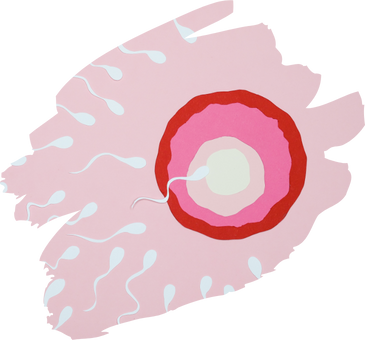Male Subfertility Services
Advanced Solutions for Male Subfertility
- Expert Care
- Proven Results
- Comprehensive Treatments for Male Fertility Challenges


Did you know that male infertility accounts for nearly 40-50% of all infertility cases worldwide? It’s a challenge faced by millions, yet often overlooked. Adding to this concern, studies reveal that sperm counts have dropped by more than 50% over the past 40 years, making advanced fertility care more crucial than ever.
Eva IVF & Women’s Centre, we believe that no challenge is too great. Male infertility is not just common—it’s treatable. With our state-of-the-art diagnostic tools and breakthrough treatments, we specialize in uncovering the root causes and crafting personalized solutions for every patient. Our experienced team is dedicated to providing innovative care in a supportive environment, helping you overcome obstacles and move closer to your dream of parenthood.
What Causes Male Infertility?
Male infertility can stem from a variety of factors, often impacting the quality or function of sperm. Understanding these causes is the first step toward finding the right treatment. Here are the most common contributors to male infertility:
Low Sperm Count: When sperm levels fall below 15 million per milliliter, the chances of successful fertilization decrease significantly. This is one of the most common causes of male infertility.
Poor Sperm Motility: Sperm that cannot swim efficiently may struggle to reach and fertilize the egg, hindering conception.
Abnormal Morphology: Irregularly shaped sperm often lack the ability to penetrate and fertilize an egg, reducing the likelihood of successful conception.
Obstructive Causes: Blockages in the reproductive tract, such as those caused by prior vasectomies or infections, prevent sperm from being released properly.
Hormonal Imbalances: Low testosterone or other hormonal issues can disrupt sperm production and overall reproductive health.
Lifestyle Factors: Factors like chronic stress, smoking, excessive alcohol consumption, obesity, and exposure to environmental toxins can all negatively impact sperm quality and fertility.
At Eva Fertility Clinic, we specialize in diagnosing and treating these underlying causes.
When Should You Check for Infertility?
Infertility can be an emotional journey, but identifying the cause early significantly improves your chances of successful treatment. Men should consider checking for infertility if they experience:
Difficulty Conceiving: If you and your partner have been trying to conceive for more than 12 months without success (or 6 months if your partner is over 35).
Abnormal Semen Analysis: Low sperm count, poor motility, or abnormal morphology identified in prior tests.
Previous Medical Conditions: A history of testicular injuries, surgeries, infections (like mumps), or chemotherapy.
Erectile or Ejaculatory Issues: Difficulty achieving or maintaining an erection, or problems with ejaculation.
Hormonal Imbalances: Symptoms like low libido, reduced muscle mass, or fatigue could indicate low testosterone levels.
Varicoceles: Enlarged veins in the scrotum, which can impair sperm quality.
Lifestyle Factors: Prolonged exposure to toxins, smoking, heavy alcohol use, or obesity that may impact fertility.
Seeking help sooner rather than later can open doors to advanced diagnostic tools and tailored treatments, ensuring the best possible outcome.
Why Do You Need a Fertility Health Assessment?
Understanding your fertility health is crucial, whether you’re actively trying to conceive or planning for the future. A Fertility Health Assessment helps pinpoint any hidden barriers to conception, enabling early intervention and tailored solutions.
It provides a clear picture of your reproductive health, empowering you to make informed decisions about your family planning journey.
Additionally, it offers peace of mind by addressing potential concerns and setting realistic expectations. Early detection of fertility issues can significantly enhance the success rate of treatments, helping you take proactive steps toward achieving your dream of parenthood.


Treatments We Provide Under Male Subfertility Services
Why Acting Early Matters?
When it comes to fertility, time plays a critical role in improving outcomes. Seeking a timely diagnosis and starting treatment early can significantly increase the chances of overcoming male infertility. Early intervention allows fertility specialists to identify and address underlying issues, such as low sperm count or hormonal imbalances, before they worsen or lead to more complex challenges.
Beyond the physical benefits, addressing fertility challenges early can have a profound positive impact on emotional well-being. Struggling with infertility often leads to stress, anxiety, and feelings of helplessness. Taking proactive steps can alleviate these psychological burdens, giving you clarity and control over your fertility journey.


FAQ – Male Subfertility Services
The best treatment for male infertility depends on the underlying cause. Options include:
- Medications or Hormone Therapy: For hormonal imbalances or low testosterone levels.
- Lifestyle Modifications: Addressing factors like diet, exercise, and stress to improve sperm health.
- Surgical Interventions: Procedures like varicocelectomy or vasectomy reversal to correct physical obstructions.
- Assisted Reproductive Techniques (ART): Treatments like ICSI (Intracytoplasmic Sperm Injection) or IVF (In Vitro Fertilization) can bypass severe sperm abnormalities.
Subfertility in males refers to a reduced ability to conceive naturally, but it doesn’t mean complete infertility. It often involves factors like:
- Low sperm count, motility, or abnormal morphology.
- Obstructions or hormonal imbalances.
Unlike infertility, subfertility means conception is still possible, though it may take longer or require medical assistance. With the right treatment, many men with subfertility achieve successful outcomes.
A male infertility specialist is typically called an andrologist, a doctor who focuses on male reproductive health and fertility issues. Urologists specializing in fertility and endocrinologists addressing hormonal imbalances also play key roles. At Eva Fertility Clinic, our team includes experienced andrologists and specialists to provide comprehensive care.
Certain drinks are known to boost sperm health due to their high nutrient content:
- Green Tea: Rich in antioxidants, it protects sperm from oxidative damage.
- Fresh Fruit Juices: Pomegranate and orange juices are loaded with vitamin C, which enhances sperm quality.
- Smoothies with Nuts and Seeds: Ingredients like walnuts and flaxseeds are excellent for improving sperm motility and morphology.
Staying hydrated with plenty of water is also essential for overall sperm health.
Yes, conception is possible with 2% sperm morphology, though it may require medical assistance. Advanced reproductive techniques like ICSI can overcome severe abnormalities by selecting the healthiest sperm for fertilization. While natural conception may be challenging, many men with low morphology successfully achieve pregnancy with tailored treatments and expert care.
